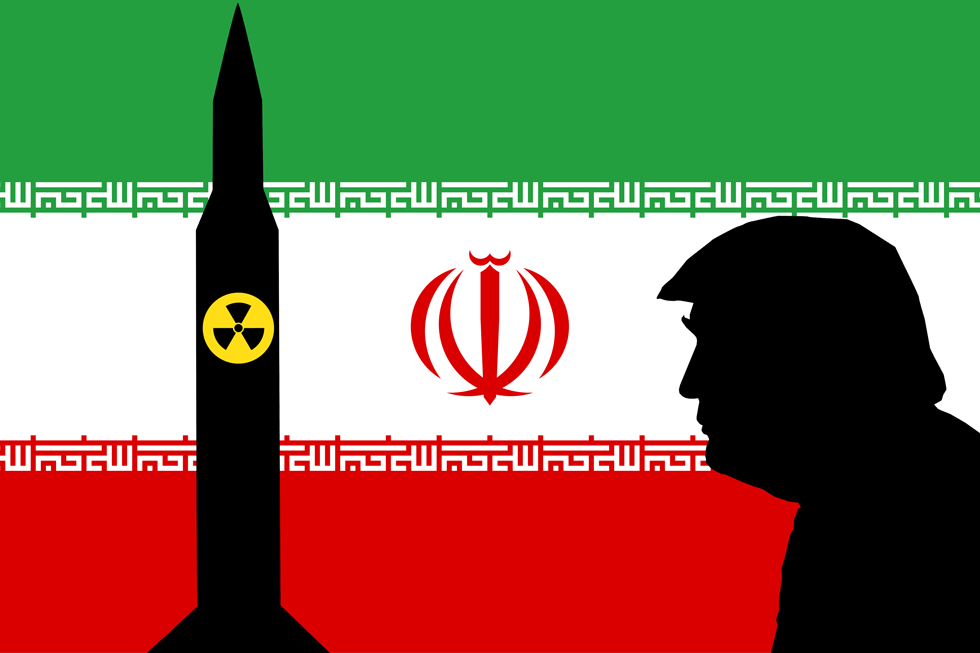

US President Donald Trump has announced that the US is to withdraw from the international agreement with Tehran to suspend sanctions on the Islamic Republic in return for Tehran suspending its nuclear programme.
In an announcement on 8 May, President Trump described the agreement, which was signed in January 2015 by the US under President Barack Obama along with the UK, France, China, Russia and Germany and the EU, as "rotten", and an "embarrassment", and said that the full weight of US sanctions would be reimposed.
The announcement follows a campaign pledge made by Trump during the US presidential elections in 2016 and comes after weeks of public statements by the US president that he intended to reimpose US sanctions.
"Flawed" deal
Trump previously said that the deal was flawed because it only limited Tehran's nuclear activities for a fixed period.
He also complained that the agreement, known as the Joint Comprehensive Plan of Action (JCPOA), had failed to stop the development of ballistic missiles by Iran.
He said the deal had also handed Iran a $100bn windfall that it used "as a slush fund for weapons, terror and oppression" across the Middle East.
Iran’s activities aside, the $100bn estimate arose in the early stages of the JCPOA negotiations, but has since been dismissed as an overvaluation, with Valiollah Seif, the chief of Iran’s central bank, projecting as early as April 2016 that only $32bn in assets could be recovered.
International reaction
Although the announcement had been expected, it followed weeks of lobbying by all of the other signatory nations to keep the agreement in place in some form.
In a joint statement, France, Germany and the UK expressed their "regret" for the US decision.
Iran’s President Hassan Rouhani meanwhile noted: "The US has announced that it doesn't respect its commitments."
Israel’s Prime Minister Benjamin Netanyahu, on the other hand, said he "fully supports" Mr Trump's "bold" withdrawal from a "disastrous" deal.
Under the terms of the JCPOA, Iran agreed to limit the size of its stockpile of enriched uranium for 15 years and the number of centrifuges installed to enrich uranium for 10 years. Iran also agreed to modify a heavy water facility so it could not produce plutonium suitable for a bomb.
Iran insists its nuclear programme is entirely peaceful, and its compliance with the deal has been verified by the International Atomic Energy Agency (IAEA).
US ambassador to the UN, Nikki Haley, said it was "the right decision", adding that the JCPOA "was a terrible deal that only allowed Iran's bad international conduct to worsen".
Impact
The US withdrawal from the JCPOA raises fears in Tehran that it might see a return to the international isolation that crippled the Iranian economy before 2015.
This time, however, other JCPOA signatories say that they will not reintroduce sanctions.
The EU's top diplomat Federica Mogherini has stated that the EU was "determined to preserve" the deal. Japan’s Foreign Ministry also called for a "continue constructive response", while the Australian Prime Minister Malcolm Turnbull has urged for restraint from all parties involved.
Even with the JCPOA in place, international business with Iran has continued to be restricted by US sanctions that have remained in place since 2015. These have prevented international financial institutions from supporting business with Iran.
| This article has been unlocked to allow non-subscribers to sample MEED’s content for FREE. MEED provides exclusive news, data and analysis about the Middle East every day. Subscribe to MEED to have full access to Middle East business intelligence. Click here |
You might also like...

Hassan Allam and Siemens confirm Hafeet Rail award
24 April 2024

UAE builds its downstream and chemical sectors
24 April 2024

Acwa Power eyes selective asset sales
24 April 2024

Bahrain mall to install solar carport
24 April 2024
A MEED Subscription...
Subscribe or upgrade your current MEED.com package to support your strategic planning with the MENA region’s best source of business information. Proceed to our online shop below to find out more about the features in each package.





